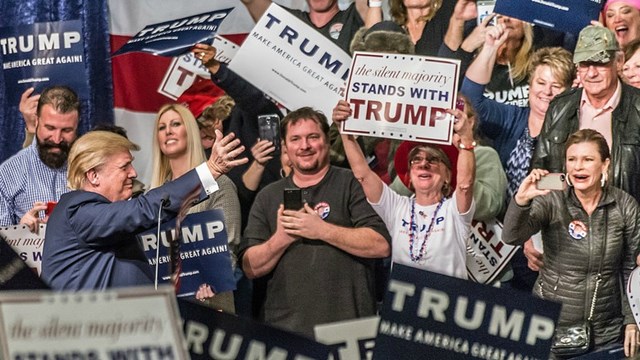Four words that reveal what his followers really believe.
I
am not a politician, but a minister who teaches theology. As a citizen of this great republic, I have convictions about domestic and foreign policy, but none of that qualifies me to join the fray of political experts and pundits. I am qualified, however, to engage the topic of significant support among self-identified “evangelical voters” for Donald Trump and what this means, not for the country but what it suggests about significant segments of the US church.
While a theological analysis of other candidates would suggest many equally troubling assumptions of their evangelical followers, no candidate is more identified with the word evangelical as is Trump. The loyalty of his self-identified evangelical followers is especially startling to many.
Let me suggest that the slender thread connecting Trump to the church is his occasional holiday appearances at Marble Collegiate Church, made famous by its pastor for 52 years, Norman Vincent Peale. Blending pop-psychology and spirituality, Peale’s The Power of Positive Thinking (1952) remained on The New York Times bestsellers list for 186 weeks. Nicknamed “God’s Salesman,” Peale was criticized for trivializing Christianity. Reinhold Niebuhr said that he “corrupts the gospel,” and that he helps people “feel good, while they are evading the real issues of life.”
Let me suggest that the slender thread connecting Trump to the church is Norman Vincent Peale.
In the 1952 election, Peale declared presidential candidate Adlai Stevenson unfit because he was divorced. For his part, Stevenson quipped, “Speaking as a Christian, I find Paul appealing and Peale appalling.” During the Kennedy-Nixon campaign, which began his long relationship with the Nixon White House, Peale declared, “Faced with the election of a Catholic, our culture is at stake.”
Trump’s parents attended Peale’s sermons each week with the family in tow, and Donald often recalls the impact on his life. He and his sisters were married by Peale.
A more recent exponent of a feel-good gospel, Joel Osteen, has called Donald Trump “a friend of our ministry” and “a good man.” Trump has previouslytweeted, “Being associated with Joel is my great honor—he’s a fantastic man!”
So when in recent months, it has appeared that Trump appeals to a sizable group of evangelicals, it may be less surprising than all the hoopla suggests. Liberty University president Jerry Falwell Jr. hailed him as “one of the greatest visionaries of our time” and a wonderful Christian brother “who reminds me of my dad.” The redoubtable Pat Robertson gushed in an interview with the empire-builder, “You inspire us all.” Robert Jeffress, pastor of First Baptist Church in Dallas, who has introduced Trump at rallies, says, “We need a strong leader and a problem-solver, hence many Christians are open to a more secular candidate.”
Vague on doctrine, infiltrated by consumerism and a sentimental moralism intent on helping us all “become a better you,” and sort of interested in “family values” as long as they don’t interfere with our own family breakdowns, many cultural evangelicals are tired of losing the culture wars. They want a winner—“a strong leader.” I’m hardly the first to point out that it’s the stuff of which demagogues are made.
It is not that Trump has caused this transformation in portions of the so-called “evangelical electorate.” Rather, his candidacy has revealed the inner secularization of significant portions of the movement, which surveys have documented for some time now. Four theological words highlight the problem.

No comments:
Post a Comment